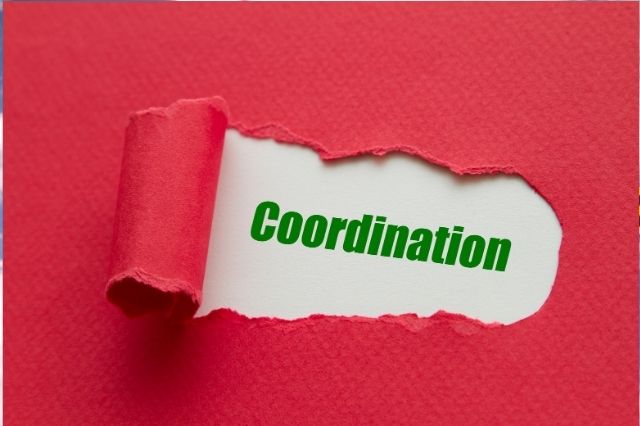What is Coordination?
Co-ordination is the unification, integration, synchronization of the efforts of group members so as to provide unity of action in the pursuit of common goals. It is a hidden force that binds all the other functions of management.
Definition:
According to Mooney and Relay, “Co-ordination is an orderly arrangement of group efforts to provide unity of action in the pursuit of common goals”.
According to Charles Worth, “Co-ordination is the integration of several parts into an orderly hole to achieve the purpose of understanding”.
Management seeks to achieve co-ordination through its basic functions of planning, organizing, staffing, directing, and controlling.
That is why co-ordination is not a separate function of management because achieving harmony between individuals’ efforts towards the achievement of group goals is key to the success of management. Co-ordination is the essence of management and is implicit and inherent in all functions of management.
Need for Coordination
The organization incorporates several departments such as Human Resource, Production, Marketing, Purchase, Sales, Finance, Research, and Development. Each department has its roles interlinked to the management. Further, an organization is divided into three primary levels, namely:
- Top-level comprises managing directors and chief executives.
- Middle-level comprises directors and departmental heads.
- Lowest-level comprises manager heads, supervisors, and forepersons.
For many organizations, the primary objective of coordination is to ensure that different departments work in the same direction to accomplish the company’s goals while maximizing resources.
It focuses on incorporating all the organization’s components in the overall plan and strategies for its success. Meanwhile, coordination tends to manage resources and team members reasonably such that no conflicts are arising in the organization. Like they put it, coordination comes with unity in the performance of organizational strategies.
Characteristics of Coordination
Coordination is the integration, unification, synchronization of the efforts of the departments to provide unity of action for pursuing common goals. A force that binds all the other functions of management.
The management of an organization endeavors to achieve optimum coordination through its basic functions of planning, organizing, staffing, directing, and controlling.
Therefore, coordination is not a separate function of management because management is successful only if it can achieve harmony between different employees and departments. Here are some important features of coordination:
1. It Integrates Group Effort
The need for coordination is felt when group effort is needed for the accomplishment of an objective. In short, it can be said that coordination is related to the group effort and not an individual effort. The question of coordination does not arise if the job is done by one person only.
2. It Ensures Unity of Action
The nature of coordination is creating unity in action. It means during the coordinating process an effort is made to create unity among the various activities of an organization. For example, the purchase and sales departments have to coordinate their efforts so that supply of goods takes place according to purchase orders.
3. It is a Continuous Process
It is not a job that can be performed once and for all, but its need is felt at every step. Many activities are performed in a business. Sometimes or the other, if any one of the activities goes on fluctuating either for more or less than required, the whole organizational balance is disrupted. Thus, a close watch has to be kept on all the activities to maintain the balance.
4. It is an All-pervasive Function
Pervasiveness refers to that truth that is applicable to all spheres (business and non-business organizations) and places uniformly. The nature of coordination is pervasive. Like the making of timetable in an educational institution is an apt example of establishing coordination.
In the game of cricket, the placement of players at pre-determined positions is nothing but coordination. In the same manner, to synchronize the activities of different departments, like purchase, sales, production, finance, etc. in a business organization is coordination.
5. It is the Responsibility of All Managers
Coordination is needed at all three, i.e., top, middle, and lower managerial levels. Different activities performed at all levels are equally important. Thus it is the responsibility of all the managers that they make efforts to establish coordination. That is why it could not be said that coordination is of more importance to any one particular managerial level or a manager.
6. A Deliberate Function
Coordination is never established by itself but it is a deliberate effort. Only cooperation does not suffice but coordination is also needed. For example, a teacher aspires to teach effectively (this is cooperation) but the timetable is not prepared in the school (this is a lack of coordination).
In this situation, classes cannot be arranged for. Here, the effort made by the teacher is meaningless, in the absence of coordination. On the other hand, in the absence of cooperation, coordination dissatisfies the employees. Thus, both are required at a given point in time.
Types of Coordination
In an organization, the efficient coordination of internal and external components helps in reducing the complexities (both internal and external).
Therefore, the organization experiences an increase in productivity, easier integration of micro and macro-level organizational dynamics, a better connection of roles among intra-organizational and inter-organizational groups as well as building trust among competing groups, and defining organizational tasks. Coordination is primarily of two types – internal coordination and external coordination as described below.
1. Internal Coordination
Internal coordination is all about establishing a relationship between all the managers, executives, departments, divisions, branches, and employees or workers. These relationships are established with a view to coordinate the activities of the organization. Internal coordination has two groups:
a. Vertical Coordination
In vertical coordination, a superior authority coordinates his work with that of his subordinates and vice versa. For example, a sales manager will coordinate his tasks with his sales supervisors. On the other hand, all sales supervisors ensure that they work in sync with the sales manager.
b. Horizontal Coordination
In horizontal coordination, employees of the same status establish a relationship between them for better performance. For example, the coordination between department heads, or supervisors, or co-workers, etc. In other words, in internal coordination, an employee either reports vertically to the supervisor and/or the subordinates and horizontally to the colleagues and/or co-workers.
2. External Coordination
As the name suggests, external coordination is all about establishing a relationship between the employees of the organization and people outside it.
These relationships are established with a view to having a better understanding of outsiders like market agencies, public, competitors, customers, government agencies, financial institutions, etc.
Usually, organizations entrust a Public Relations Officer (PRO) with the responsibility of establishing cordial relationships between the employees of the organization and outsiders.
Coordination – The Essence of Management
Coordination is the essence of management as it is inseparable from the following managerial functions:
-
Co-ordination Through Planning
In planning, coordination allows a manager to assess what he must include and/or exclude in a good plan. Planning also facilitates coordination by integrating various plans through mutual discussion and exchanging ideas.
-
Co-ordination Through Organizing
Organizing requires a lot of coordination. Whenever the management assigns tasks or activities to individuals or groups, coordination allows them to organize it well.
-
Co-ordination Through Staffing
In staffing, coordination helps to specify the type of staff required and its rational placement. For better coordination, the management always ensures that they hire the right number of employees with the appropriate skills and qualifications. This also ensures that they have the right men in the right job.
-
Co-ordination Through Directing
In directing, coordination provides focus to the manager. In fact, the purpose of giving orders or instructions to subordinates is served only when there is a sense of coordination and harmony between them.
-
Co-ordination Through Controlling
Coordination makes reporting realistic. Through coordination, the management ensures that the actual performance is as close to the standard performance as possible.
Importance of Coordination
1. Unity of Direction
An organization needs to integrate the efforts and skills of different employees in order to achieve common objectives. Coordination also eliminates duplication of work leading to cost-efficient operations.
2. Functional Differentiation
An organization has many departments or sections performing different functions. All these functions are important for achieving the overall goals of the organization. If all departments work in isolation from the others, then they might not work in tandem. Therefore, coordination is essential for integrating the functions.
3. Lesser Disputes
Many departments play an important role in helping the organization achieve its goals. They are also capable of assessing the nature and scope of work they perform. However, they are usually unaware of the importance of other department’s roles leading to disputes. Coordination can help solve such disputes.
4. Reconciliation of Goals
All individuals have their own goals which are more important to them than the organization’s goals. Coordination helps to reconcile the employee’s goals with the departmental and organizational goals.
5. Differentiation and Integration
Usually, the activities of an organization are divided into two types of units – specialized and homogeneous. Also, to achieve group efforts, authority is delegated to different levels in the organization. Coordination facilitates this process.
6. Optimum Utilization of Resources
Primarily, coordination ensures that employees do not engage in cross-purpose work since it brings together the human and material resources of the organization. Therefore, there is less wastage of resources which helps the organization utilize them optimally.
7. Encourage Team Spirit
In an organization, there exist many conflicts between employees, departments, etc. Coordination encourages people and departments to work as one big team and achieve the common objectives of the organization. Therefore, it encourages team spirit.
Limitations of Coordination in Management
Now, that you understand the importance of coordination in management, you also need to note that in practice, coordination faces some problems. Here are the limitations of coordination in management:
1. Lack of Administrative Talent
While hiring employees, it is possible that some inefficient candidates get selected who do not understand the administrative procedures properly. This can result in ineffective coordination.
2. Misunderstanding
In a large organization, hundreds of employees work together and interact on a daily basis. Ideally, they must have a mutual understanding and work as a team. However, in many cases, misunderstandings creep in between employees which creates a problem in coordination.









